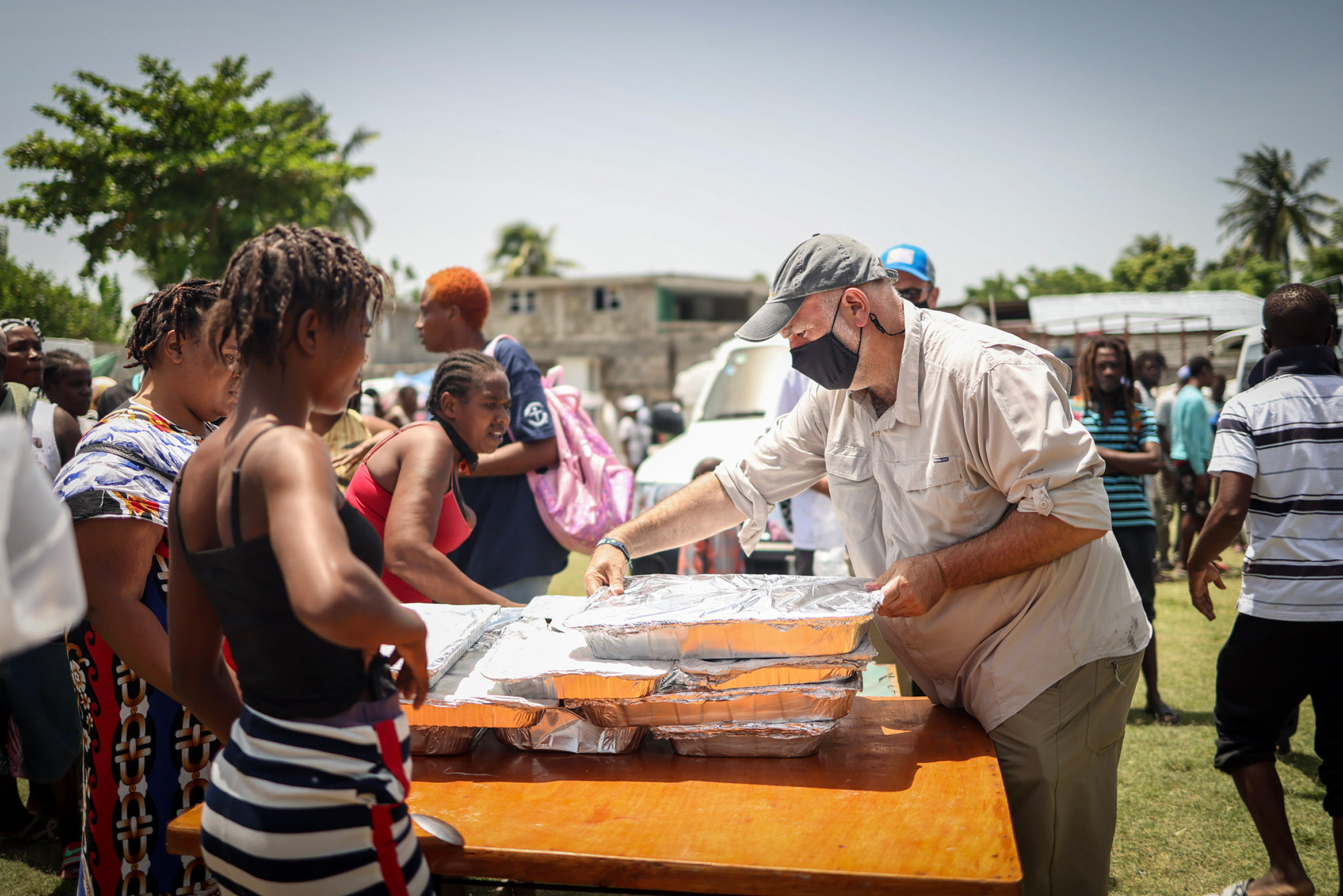Earlier this year, after earthquakes devastated much of eastern Türkiye (Turkey), I met a chef in the city of Gaziantep named Ramazan. After more than half a century spent working in restaurants, Ramazan wasted no time putting his skills to use serving hot soup on the streets, mere hours after the disaster. When World Central Kitchen—the food relief nonprofit I founded in 2010—established a temporary headquarters nearby, Ramazan was right there with a brigade of chefs who everyday made tens of thousands of meals for the quakes’ survivors.
Cooperation, trust, respect, and love turned this kitchen into a community, united by constant and consistent collaboration.
To me, community is a feeling—an energy that comes from being surrounded by people who care about each other, who know they’ll be sharing and shaping a future together. But it’s also an act, a way of being, of coexisting with those around us.
As world leaders gather in New York for the United Nations General Assembly to build consensus and seek solutions to humanity’s most pressing issues: climate change, war, migration, famine. Speeches are given, hearings are held, declarations and commitments are made—year after year. We often refer to what steps the “international community” is taking to address these grave crises, but from the skyscrapers of New York, the people impacted by these crises are too often nameless and faceless, mere data points on a graph.
Read More: ‘Without Empathy, Nothing Works.’ Chef José Andrés Wants to Feed the World Through the Pandemic
There cannot be “us” and “them”—no more conferences isolated from the realities of the climate crisis or panels about food security without people who’ve been hungry. A true international community can exist only when we take time to listen to one another, give voice to those who have been voiceless, and roll up our sleeves to work side-by-side.
The hot bowls of soup I saw Ramazan passing out on the streets of Gaziantep are a stark contrast to air-dropped Meals Ready-to-Eat that symbolize the expensive, impersonal, and slow-moving approach of traditional humanitarian aid. If we are there to tell people what they need, we’ve already failed. If we are there to listen, we can succeed.
The most effective organizations—and leaders—are the ones with boots on the ground, seeking to listen as much as to help, not coming in and declaring what’s best. Think of Jimmy and Rosalyn Carter, who have built thousands of houses with their own hands and re-defined the American post-presidency; or Volodymyr Zelenskyy, whose constant presence on the frontlines has rallied the world to the Ukrainian people’s cause of freedom and democracy.
And there are diplomats like Linda Thomas-Greenfield, the United States’ ambassador to the U.N, who, like me, believes in the power of food to build longer tables. A native Louisianan, she’s become well-known for her embrace of “gumbo diplomacy,” the idea that the most effective way to build consensus is by literally breaking bread. She must know that the word “community” comes from the same word as “commensality”—to eat together. No wonder she focused the U.S.’s presidency of the U.N. Security Council last month on an historic, unanimous resolution against using food as a weapon of war.
Wherever World Central Kitchen responds, we start by listening, and develop our response based on what we hear. We’ll set up in a central location—like we did in Gaziantep—to distribute meals to people who need them. Then next to us, a group will start to distribute water. And next to them it’s clothing, and toys for children, and fuel, and materials for rebuilding. Food creates a rallying point for relief and hope, a space to exchange vital information and begin the emotional process of putting life back together. Food becomes community.
The reasons for this approach are as pragmatic as they are idealistic. We activate local restaurants not only because it’s faster than waiting to fly in ourselves, but because their chefs’ valuable intel helps us reach a community’s most vulnerable. We offer dishes familiar to each locale not just for the intangible comfort it provides, but because the ingredients are readily available and it’s what our volunteers know how to cook. We serve out of schools and churches because they are both centrally positioned and inherently trusted as safe spaces.
Read More: The Food World Needs to Listen to the Real Cultural Experts, Not Just Use Their Ingredients
I have seen firsthand the power of food to rebuild lives and revive economies. Each hot meal that we serve represents a time when people came together to help one another with little more than the ingredients they had and empathy in their hearts. Each one is a small part of the story of how we transform a kitchen into a place of healing, where everyone is welcome to be part of the solution. If this model of local empowerment works for fighting hunger in emergencies, I believe humanitarian agencies and international development organizations can use it to overcome the challenges currently preventing them from delivering aid more efficiently and effectively.
At UNGA, instead of empty speeches, I’m calling for meaningful action—collaboration of the sort that truly nourishes the bodies and spirits of those we cannot afford to keep failing. The doors of our World Central Kitchen are open to all. I hope the international community will join us in writing new recipes to feed a hungry world.
José Andrés is a chef, humanitarian, and the founder of World Central Kitchen, whose new cookbook Feeding Humanity, Feeding Hope is available now.
- The 100 Most Influential People of 2024
- How Far Trump Would Go
- Why Maternity Care Is Underpaid
- Scenes From Pro-Palestinian Encampments Across U.S. Universities
- Saving Seconds Is Better Than Hours
- Why Your Breakfast Should Start with a Vegetable
- Welcome to the Golden Age of Ryan Gosling
- Want Weekly Recs on What to Watch, Read, and More? Sign Up for Worth Your Time
